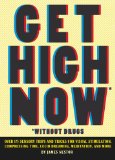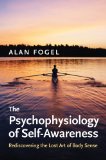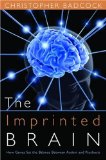September 3, 2009
Get High Now (without drugs) by James Nestor (Chronicle Books, 2009)
(link for UK)

Product description:
Get High Now is an illustrated, mind-blowing magic carpet ride of more than 200 ways to alter human perception and consciousness-without drugs or alcohol. Culled from science, physiology, spiritual practices, and the audio visual arts, these “all natural” highs playfully and safely explore the mind-body connection to entertaining and illuminating effect. Accessible and well-researched, each entry introduces concepts such as lucid dreaming, optical and auditory illusions, controlled breathing, meditation, time compression, and physical and mental exercises, explaining the ways in which they affect our minds and bodies and how to do them. Readers follow the author and his “HighLab” testing team through mind-bending and sometimes hilarious investigations, such as how to lull the mind into hallucinatory states with audio loops; why multiple bee stings lead to euphoric states; what cheeses to eat to induce psychedelic lucid dreams; how to control your breathing to create an out-of-body experience; and many more. Including solo, tandem, and group highs, Get High Now features hundreds of ways to calm or stimulate the senses and open new windows to experiencing the world.
Time Magazine selected the website for this book as one of its 50 Best Websites 2009, calling it “a science site disguised as mind-expansion.”
Comments (0)
- consciousness,new books,psychology
September 1, 2009
The Psychophysiology of Self-Awareness: Rediscovering the Lost Art of Body Sense (Norton Series on Interpersonal Neurobiology) by Alan Fogel (W.W. Norton, 2009)
(link for UK).

Product description from the publisher:
The practice and science of feeling our movements, sensations, and emotions. Embodied self-awareness is the practice and science of our ability to feel our movements, sensations, and emotions. As infants, before we can speak or conceptualize, we learn to move toward what makes us feel good and away from what makes us feel bad. Our ability to continue to develop and cultivate awareness of such body-based feelings and understanding is essential for learning how to successfully navigate in the physical and social world, as well as for avoiding injury and stress. The book explains the neurological basis of embodied self-awareness, how to enhance self-awareness, and how to regain it after injury or trauma.
See also: Author’s blog, Body Sense, at Psychology Today
Comments (1)
- consciousness,meditation,new books
July 20, 2009

Something to check out, especially for those with access to an academic library: The Oxford Companion to Consciousness edited by Tim Bayne, Axel Cleeremans, and Patrick Wilkens.
Product Description from the publisher:
Consciousness is undoubtedly one of the last remaining scientific mysteries and hence one of the greatest contemporary scientific challenges. How does the brain’s activity result in the rich phenomenology that characterizes our waking life? Are animals conscious? Why did consciousness evolve? How does science proceed to answer such questions? Can we define what consciousness is? Can we measure it? Can we use experimental results to further our understanding of disorders of consciousness, such as those seen in schizophrenia, delirium, or altered states of consciousness?
These questions are at the heart of contemporary research in the domain. Answering them requires a fundamentally interdisciplinary approach that engages not only philosophers, but also neuroscientists and psychologists in a joint effort to develop novel approaches that reflect both the stunning recent advances in imaging methods as well as the continuing refinement of our concepts of consciousness.
In this light, the Oxford Companion to Consciousness is the most complete authoritative survey of contemporary research on consciousness. Five years in the making and including over 250 concise entries written by leaders in the field, the volume covers both fundamental knowledge as well as more recent advances in this rapidly changing domain. Structured as an easy-to-use dictionary and extensively cross-referenced, the Companion offers contributions from philosophy of mind to neuroscience, from experimental psychology to clinical findings, so reflecting the profoundly interdisciplinary nature of the domain. Particular care has been taken to ensure that each of the entries is accessible to the general reader and that the overall volume represents a comprehensive snapshot of the contemporary study of consciousness. The result is a unique compendium that will prove indispensable to anyone interested in consciousness, from beginning students wishing to clarify a concept to professional consciousness researchers looking for the best characterization of a particular phenomenon.
Comments (0)
- consciousness,new books
June 13, 2009

The Imprinted Brain: How Genes Set the Balance of the Mind Between Autism and Psychosis by Christopher Badcock (Jessica Kingsley Publishers, 2009)
Product description from the publisher:
“The Imprinted Brain” sets out a radical new theory of the mind and mental illness based on the recent discovery of genomic imprinting. Imprinted genes are those from one parent that, in that parent’s interest, are expressed in an offspring rather than the diametrically opposed genes from the other parent. For example, a higher birth weight may represent the dominance of the father’s genes in leading to a healthy child, whereas a lower birth weight is beneficial to the mother’s immediate wellbeing, and the imprint of the mother’s genes will result in a smaller baby. According to this view, a win for the father’s genes may result in autism, whereas one for the mother’s may result in psychosis. A state of equilibrium – normality – is the most likely outcome, with a no-win situation of balanced expression. Imprinted genes typically produce symptoms that are opposites of each other, and the author uses psychiatric case material to show how many of the symptoms of psychosis can be shown to be the mental mirror-images of those of autism. Combining psychiatry with insights from modern genetics and cognitive science, Christopher Badcock explains the fascinating imprinted brain theory to the reader in a thorough but accessible way. This new theory casts some intriguing new light on other topics as diverse as the nature of genius, the appeal of detective fiction, and the successes – and failures – of psychoanalysis. This thought-provoking book is a must-read for anyone with an interest in autism, psychiatry, cognitive science or psychology in general.
See also: “Imprinted Brain Theory” at Edge
Comments (0)
- cognitive science,consciousness,new books,philosophy of mind
June 2, 2009
Virtual Selves, Real Persons: A Dialogue across Disciplines by Richard S. Hallam (Columbia University Press, 2009)

Product description from the publisher:
How do we know and understand who we really are as human beings? The concept of ‘the self’ is central to many strands of psychology and philosophy. This book tackles the problem of how to define persons and selves and discusses the ways in which different disciplines, such as biology, sociology and philosophy, have dealt with this topic. Richard S. Hallam examines the notion that the idea of the self as some sort of entity is a human construction and, in effect, a virtual reality. At the same time, this virtual self is intimately related to the reality of ourselves as biological organisms. Aiming to integrate a constructionist understanding of self with the universalizing assumptions that are needed in natural science approaches, this text is unique in its attempt to create a dialogue across academic disciplines, while retaining a consistent perspective on the problem of relating nature to culture.
An excerpt is available from the publisher’s website.
Comments (0)
- consciousness,new books,self







